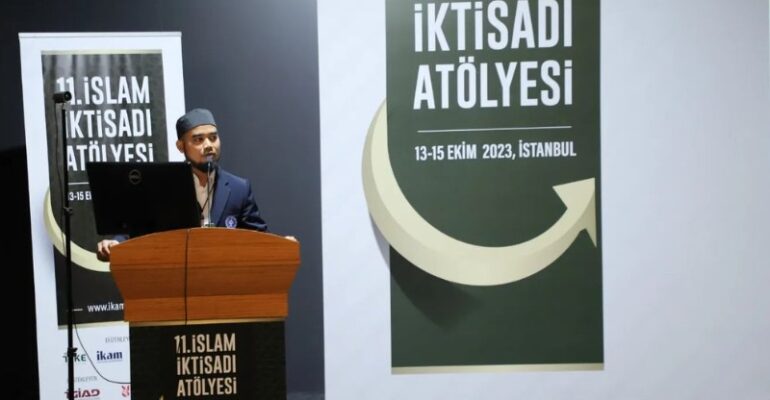Waqf-Based Forests and Environmental Sustainability: Highlights from Istanbul’s 11th Islamic Economics Workshop

Waqf-Based Forests and Environmental Sustainability: Highlights from Istanbul’s 11th Islamic Economics Workshop
Head of the Islamic Economics Department, Faculty of Economics and Management, IPB University
The waqf-based forest program, namely developing forests on waqf land, has received a positive response from the community and is being touted as an alternative solution to protect forests. This statement was conveyed by Dr Khalifah Muhamad Ali, SHut, MSi, as the Head of the Islamic Economics Department, Faculty of Economics and Management, IPB University, and Head of the Bogor Waqf Forest Foundation, while attending the 11th Islamic Economics Workshop in Istanbul, Turkey.
This workshop, organized by the Islamic Economics Research Center (IKAM), raised the topic “Islamic Economics and Environment”. For 3 days, on 13-15 October 2023, welcome speech sessions, inaugural panels, and workshop sessions were held. During the workshop, which was attended by scholars from countries such as Indonesia, Qatar, Malaysia, Pakistan, the United Arab Emirates, and Turkey, presentations were made on the causes of environmental crises, ways to combat these crises, and what Islamic economics and finance can offer. Dr Khalifah was one of the representatives from IPB University, sponsored by the Staff Mobility Assistance Program from the EQUITY Project for the 2023/2024 Fiscal Year.
In the workshop session, Dr Khalifah presented the results of his research with Prof Salina Kassim and Dr Miftahul Jannah entitled “Investigating the Factors Influencing Community Participation in the Waqf-Based Forest Program.” The presentation explained the waqf-based forest program developed in Indonesia, its management scheme, and the community’s response to the program.
Based on the research results using questionnaire methods and SEM (Structural Equation Modelling) analysis, the waqf-based forest program received a positive response from the community. Almost all respondents strongly agree that they are willing to participate in the current waqf-based forest program. Then, several variables tested, such as religiosity, trust in waqf institutions, environmental concern, attitude, subjective norms, and perceived behavioral control, were found to significantly affect people’s intentions to be involved in the waqf-based forest program.
The presentation closed with plans for the future development of waqf-based forests. It includes developing a dedicated digital platform to serve as a waqif, nazhir, and mauquf’alaihi hub. It is hoped that through this application, all relevant stakeholders and activities in the waqf-based forests can be integrated and further developed.
This presentation received a positive response from workshop participants. Waqf-based forests are an example of the actual application of the concept offered at the workshop: Islamic economics proposes a way out for the environmental crises. With its tools and institutions, Islamic economics and finance offer significant opportunities to all humanity in combating environmental crises.
This workshop provides a deeper understanding of how Islamic economics principles can be applied to support sustainable development, such as in the agro-maritime sector in Indonesia, which is in line with IPB University. Apart from that, with the introduction of waqf-based forests as a solution to protect forests that combine sustainable forest management and Islamic Social Finance, it is hoped that opportunities for research and development collaboration will be opened with various Islamic Economic experts and researchers worldwide.


